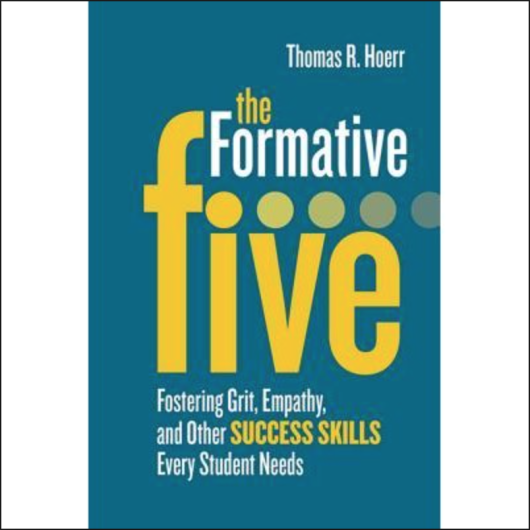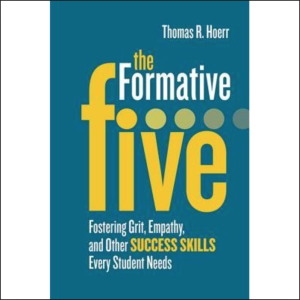

In an era when accountability and standardized tests dominate, it can be difficult to get school administrators, teachers, or parents to focus on social and emotional skills, but these skills may be what matters most for success. Specifically, Hoerr identifies five skills that make students successful and that students can refine with good teaching. Two of these are relationship oriented skills—empathy and embracing diversity—and three are about how people engineer their own thoughts and actions—self-control, integrity, and grit. This book is a useful guide for helping teachers and school principals foster “the formative five,” as it is filled with practical tips, recommended readings, descriptions of prototypical students who do or do not possess each skill, and quizzes about one’s own beliefs and practices around the skill.
The first of the formative five skills is empathy—adopting another person’s perspective to understand how that person feels. Empathy, Hoerr argues, is not simply taking another person’s perspective; rather it requires learning also to value and respect that person. Beyond shaping people who treat one another well, empathy facilitates success in business. Hoerr suggests teaching empathy by valuing growth in empathic abilities, teaching students to listen closely to others, and creating safe spaces for students to share personal stories.
The second of the relationship oriented skills, embracing diversity, involves appreciating the differences among the people with whom one interacts. Exercising this skill can feel uncomfortable; some may even reject the need for it. Indeed, our evolutionary roots as tribal people may partially explain why embracing diversity does not always come naturally. Nonetheless, in our diversifying world this skill not only is necessary, but also it can facilitate learning about people’s experiences. To fully embrace diversity we need to understand the complex history of discrimination and inequality in our society. We ought to guide students in understanding their own identities and how that shapes their interactions with others. Creating situations in which students can work collaboratively with diverse peers can help students embrace diversity. Schools need to ensure that all students are safe and treated with dignity.
Students benefit from developing skill in demanding the most of themselves. Hoerr cites the work of Walter Mischel (reviewed here) arguing that self-control—one’s ability to modulate one’s own actions and delay gratification—can have a major impact on one’s long-term well-being. Helping students to set goals and to be mindful of their current actions and the implications for their future can help them develop self-control. Hoerr references Angela Duckworth’s work about grit (reviewed here), or tenacity and perseverance, to argue that when we help shift students’ attitudes about what it takes to succeed, we prepare them for success and the rewards that come with sustained effort, deliberate practice, and pursuit of a passion. Especially given that today kids are praised for even minor accomplishments, it is important that students learn that to truly succeed they need to persist through failures. We can help students be “grittier” by touting the importance of grit.
The fifth skill is integrity, which has to do with being honest in one’s public actions, living in accordance with one’s personal values, and working to address social problems. To foster integrity it is helpful to model honesty, define integrity, highlight opportunities to act with integrity, and explain that it can be difficult to act with integrity.
Hoerr concludes by arguing that schools need a cultural shift to foster “the formative five.” Creating the desired schools culture is facilitated by ensuring that teachers, parents, administrators, and students all have strong relations and effective communication channels with one another. That the federal Every Student Succeeds Act requires the measurement of at least one nonacademic skill is a promising move towards focusing on personal skills that help students succeed. By developing students skill in empathizing, embracing diversity, exerting self-control and grit, and acting with integrity we can help raise a generation of students of whom we will be proud not only for what they know, but more importantly, for the people that they are.
Hoerr, T. R. (2016). The Formative Five: Fostering Grit, Empathy, and Other Success Skills Every Student Needs. ASCD.




